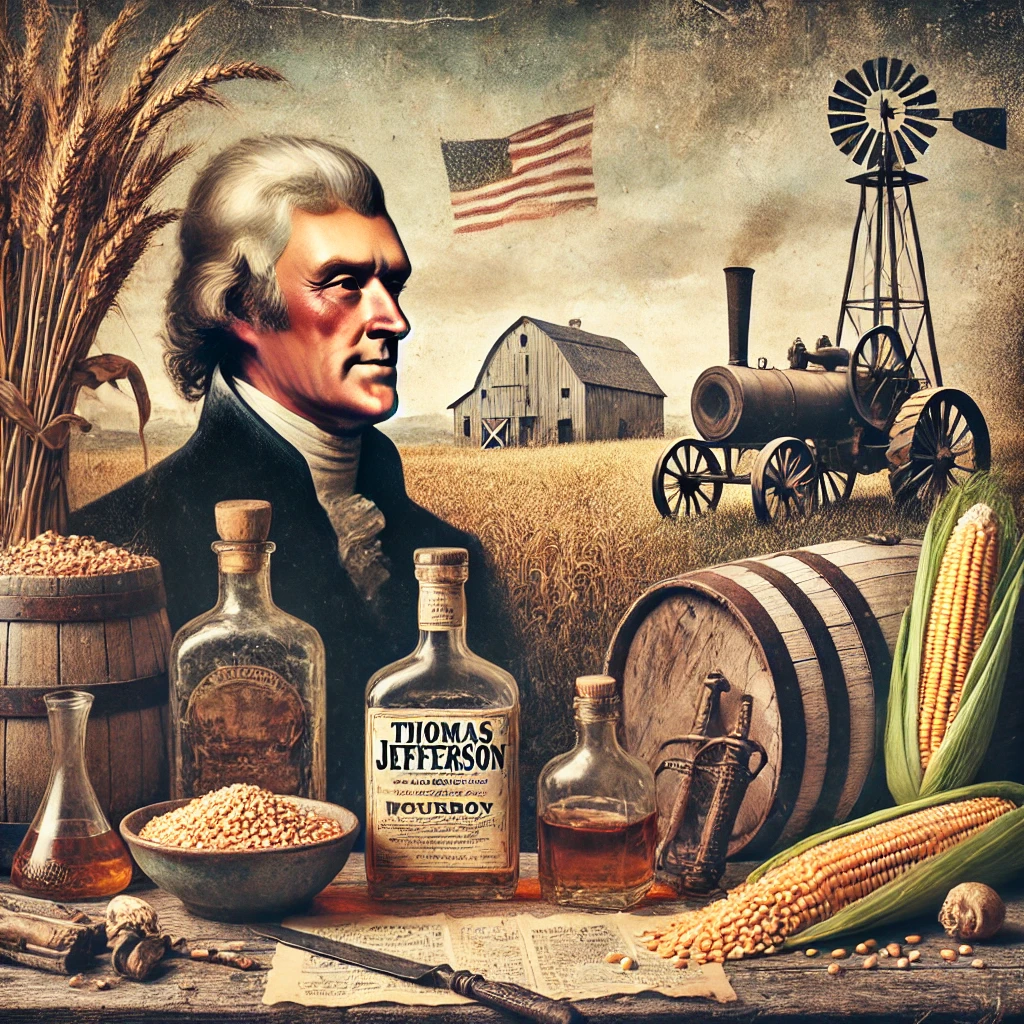Introduction
Thomas Jefferson is best known as a Founding Father, author of the Declaration of Independence, and third president of the United States. But his influence extends beyond politics and into the fields of agriculture and early American whiskey-making. While Jefferson wasn’t a distiller like George Washington, his policies and passion for agriculture helped lay the foundation for what would become bourbon country. In today’s post, we’ll explore how Jefferson’s legacy is connected to the growth of American whiskey and his lasting impact on bourbon.
Jefferson’s Vision for an Agrarian America
Thomas Jefferson envisioned an America built on the virtues of farming and self-sufficiency. As a strong advocate of the “yeoman farmer”—the independent, land-owning farmer—Jefferson believed that agriculture was the foundation of American democracy. This philosophy guided much of his political career and shaped his policies as president, particularly those related to farming and land use.
Jefferson’s agricultural vision extended to crops like corn, wheat, and rye, all of which were vital to American distilling. His encouragement of farming supported the production of these grains, which later became essential ingredients in whiskey and bourbon. This focus on agriculture gave American settlers the resources to start their own small distilleries, paving the way for local whiskey production in states like Kentucky and Virginia.
The Louisiana Purchase and the Expansion of Whiskey
One of Jefferson’s most significant actions as president was the Louisiana Purchase in 1803. By doubling the size of the United States, Jefferson opened up vast new lands for agriculture and settlement, pushing American frontiers westward. The fertile land of Kentucky, which had already been settled in part by Scotch-Irish immigrants skilled in distilling, soon became an epicenter for whiskey production.
With the westward expansion, whiskey distillers found new opportunities in Kentucky and Tennessee, where the water and climate proved ideal for producing what would later become bourbon. Although bourbon wasn’t officially recognized yet, Jefferson’s expansion of U.S. territory laid the groundwork for the development of American whiskey in the frontier regions.
Supporting American-Made Spirits
Jefferson was a firm believer in supporting American industries and reducing reliance on imported goods. In the early days of the republic, rum and brandy from Europe and the Caribbean were common imports, but Jefferson saw the potential in American-made spirits. His administration encouraged the production of whiskey by implementing import taxes that made foreign spirits more expensive.
These policies helped shift American drinking habits toward locally produced whiskey. As a result, whiskey became an increasingly popular choice, especially in rural areas where it was cheaper and more accessible than imported liquors. Jefferson’s commitment to American-made products indirectly fostered a whiskey culture that would later grow into the distinctly American bourbon industry.
Jefferson’s Personal Relationship with Whiskey
While Jefferson was not a heavy drinker, he did enjoy a glass of whiskey on occasion. He even included whiskey in the supplies for Monticello, his Virginia estate. However, Jefferson was more known for his love of wine, which he developed during his time in France. Despite his preference for wine, he respected American-made whiskey and acknowledged its importance to the culture and economy of the young nation.
Interestingly, Jefferson’s passion for wine and viticulture also had an indirect influence on bourbon. His experiments with different crops at Monticello contributed to the agricultural knowledge that later benefited the whiskey industry, as farmers adopted similar methods to grow and cultivate grains for distilling.
Jefferson’s Lasting Influence on Bourbon Country
Thomas Jefferson’s legacy in American whiskey culture may not be as direct as George Washington’s distillery, but his influence is deeply embedded in the history of bourbon. By promoting agriculture, expanding American territory, and supporting domestic production, Jefferson created the conditions for bourbon to flourish in the years after his presidency.
In fact, his connection to bourbon country is still visible today. Several Kentucky counties, including Jefferson County, were named in his honor. Kentucky would eventually become the heart of bourbon production, carrying on the traditions of distilling that Jefferson indirectly supported.
The Final Sip
Thomas Jefferson may not have been a distiller, but his contributions to American agriculture, territory expansion, and whiskey culture helped shape the future of bourbon. His policies laid the groundwork for a self-sustaining America, one where whiskey would soon play a central role in both culture and commerce. As we continue our Bourbon & the Presidency series, let’s raise a glass to Jefferson—the visionary whose love for agriculture helped create the foundation of bourbon country. Join me next time as we explore Andrew Jackson’s connection to American whiskey and his role in spreading the spirit of Southern distilling.
